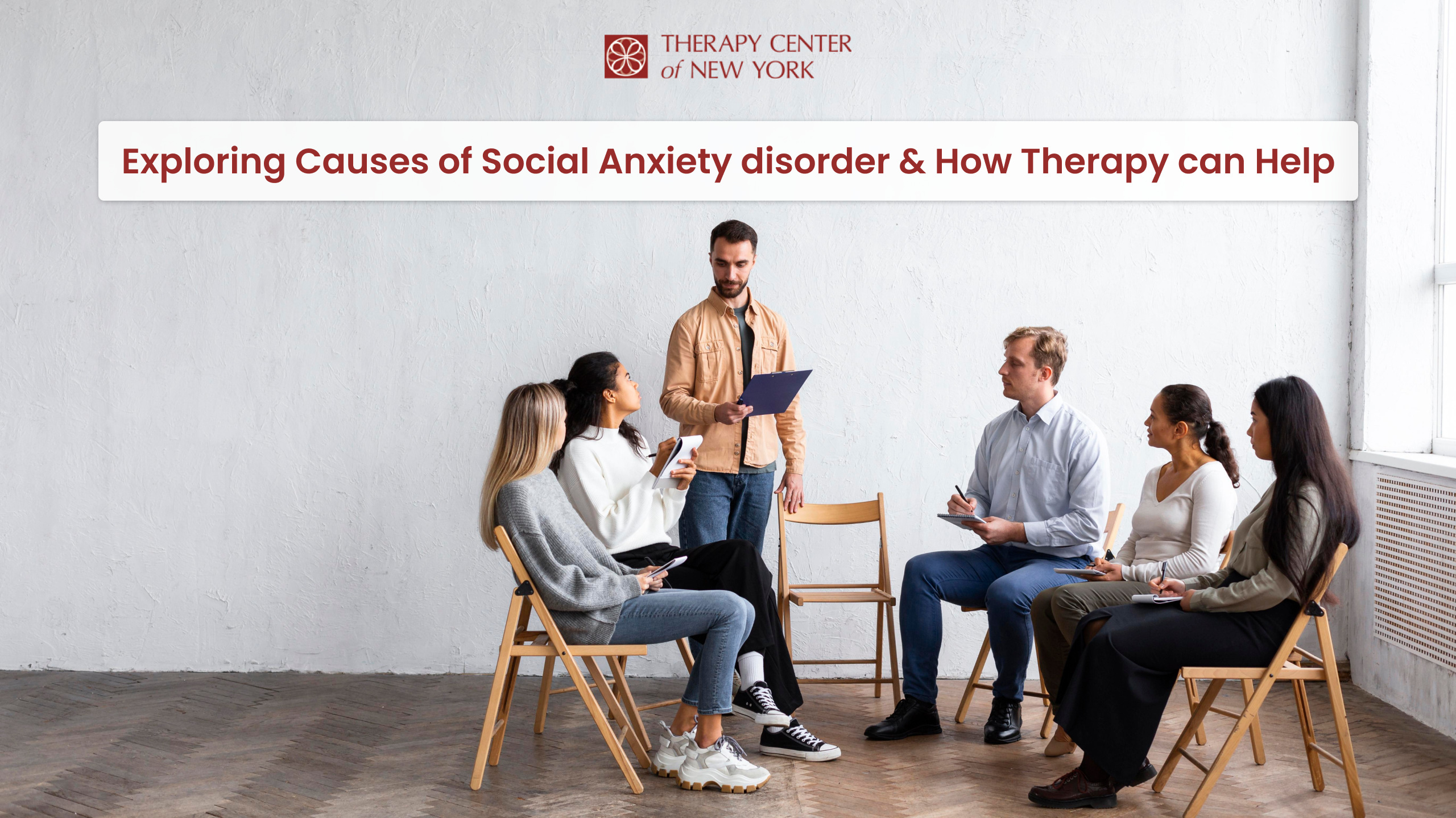Exploring the Causes of Social Anxiety Disorder & How Therapy Can Help
- by The TCNY Care Team

Social anxiety disorder, also known as social phobia, is a prevalent mental health condition characterized by an intense fear of social situations. People with social anxiety experience overwhelming anxiety and self-consciousness in everyday interactions, dreading judgment or scrutiny from others. This fear can significantly impact their quality of life, hindering their ability to form relationships, pursue careers, or even engage in basic activities. Understanding the causes of social anxiety disorder and the potential benefits of social anxiety therapy is crucial for both individuals struggling with the condition and those seeking to support them.
Causes of Social Anxiety Disorder
The exact cause of social anxiety disorder remains unknown, but research suggests a complex interplay of factors contributes to its development. Here's a breakdown of the potential influences:
- Genetics: Studies indicate a genetic predisposition to social anxiety disorder. If you have a close family member with the condition, you may be at a higher risk of developing it yourself.
- Brain Chemistry: Imbalances in neurotransmitters like serotonin, dopamine, and glutamate, which regulate mood and emotions, might play a role.
- Environmental Factors: Negative childhood experiences, such as bullying, abuse, or social rejection, can trigger social anxiety in vulnerable individuals.
- Life Events: Traumatic experiences, like public speaking blunders or social humiliation, can spark the development of social anxiety.
Symptoms of Social Anxiety Disorder
People with social anxiety disorder experience a range of physical and emotional symptoms in social settings, including:
- Intense anxiety and nervousness
- Fear of being scrutinized or judged
- Blushing, sweating, or trembling
- Difficulty making eye contact
- Rapid heartbeat or shortness of breath
- Nausea or dizziness
- Difficulty speaking or participating in conversations
- Avoiding social situations altogether
The severity of these symptoms varies greatly from person to person. However, if left untreated, social anxiety disorder can become increasingly debilitating, hindering personal and professional growth.
How Social Anxiety Therapy Can Help
Social anxiety disorder is a highly treatable condition. With the help of a qualified therapist, individuals can learn to manage their anxiety and develop effective coping mechanisms. Social anxiety therapy typically involves a combination of approaches:
- Cognitive Behavioral Therapy (CBT): The best treatment for social anxiety disorder is cognitive behavioral therapy (CBT). It helps identify and challenge negative thought patterns that contribute to social anxiety. Through cognitive behavioral therapy (CBT), people can identify these false ideas and replace them with more powerful and realistic views.
- Exposure Therapy: This technique gradually exposes individuals to the social situations they fear most, in a safe and controlled environment. By confronting their anxieties in a structured way, they develop coping skills and build confidence.
- Social Skills Training: For some individuals, social anxiety stems from a lack of confidence in their social abilities. Social skills training equips them with the tools they need to initiate conversations, maintain eye contact, and navigate social interactions more effectively.
Benefits of Social Anxiety Therapy
Social anxiety therapy offers a multitude of benefits for individuals struggling with this condition. Here are some key advantages:
- Reduced Anxiety: Therapy equips individuals with techniques to manage anxiety in social situations, leading to a significant decrease in fear and nervousness.
- Increased Confidence: By overcoming challenges and developing coping mechanisms, individuals build confidence in their social abilities.
- Improved Quality of Life: Effective treatment allows individuals to participate in social activities they previously avoided, fostering stronger relationships and a more fulfilling life.
Additional Tips for Managing Social Anxiety
While therapy is the most effective treatment for social anxiety disorder, here are some additional tips that can complement your treatment plan:
- Practice Relaxation Techniques: Techniques like deep breathing, meditation, and progressive muscle relaxation can help manage anxiety symptoms in the moment.
- Join a Support Group: Connecting with others who understand your struggles can provide invaluable support and encouragement.
- Maintain a Healthy Lifestyle: Getting regular exercise, eating a balanced diet, and getting enough sleep can significantly improve your overall well-being and reduce anxiety levels.
- Be Kind to Yourself: Social anxiety can be tough, but remember to be patient and compassionate with yourself. Celebrate your progress, no matter how small.
Further Resources:
Here are some additional resources to deepen your understanding of social anxiety disorder and explore various treatment options:
- National Institute of Mental Health (NIMH): Social Anxiety Disorder
- Anxiety and Depression Association of America (ADAA): Social Anxiety Disorder
Social anxiety disorder can be debilitating, but with the correct therapy, people can live full lives. Understanding the underlying reasons of social anxiety disorder and obtaining expert assistance through social anxiety treatment are critical steps toward recovery. Therapy Center of New York offer extensive and effective treatment alternatives to help people overcome social anxiety and accomplish their personal and professional goals.
Individuals suffering with social anxiety disorder can reclaim their lives and thrive in social circumstances by addressing the root reasons and using evidence-based therapy approaches. If you or someone you know suffers from social anxiety disorder, contact a therapy center in New York to learn about possible treatment options.
